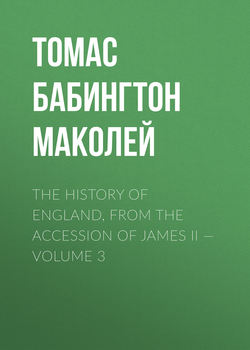The History of England, from the Accession of James II — Volume 3

Реклама. ООО «ЛитРес», ИНН: 7719571260.
Оглавление
Томас Бабингтон Маколей. The History of England, from the Accession of James II — Volume 3
CHAPTER XI
CHAPTER XII
CHAPTER XIII
CHAPTER XIV
CHAPTER XV
CHAPTER XVI
Footnotes:
Отрывок из книги
WILLIAM had assumed, together with the title of King of England, the title of King of Ireland. For all our jurists then regarded Ireland as a mere colony, more important indeed than Massachusetts, Virginia, or Jamaica, but, like Massachusetts, Virginia, and Jamaica, dependent on the mother country, and bound to pay allegiance to the Sovereign whom the mother country had called to the throne, 114
In fact, however, the Revolution found Ireland emancipated from the dominion of the English colony. As early as the year 1686, James had determined to make that island a place of arms which might overawe Great Britain, and a place of refuge where, if any disaster happened in Great Britain, the members of his Church might find refuge. With this view he had exerted all his power for the purpose of inverting the relation between the conquerors and the aboriginal population. The execution of his design he had intrusted, in spite of the remonstrances of his English counsellors, to the Lord Deputy Tyrconnel. In the autumn of 1688, the process was complete. The highest offices in the state, in the army, and in the Courts of justice, were, with scarcely an exception, filled by Papists. A pettifogger named Alexander Fitton, who had been detected in forgery, who had been fined for misconduct by the House of Lords at Westminster, who had been many years in prison, and who was equally deficient in legal knowledge and in the natural good sense and acuteness by which the want of legal knowledge has sometimes been supplied, was Lord Chancellor. His single merit was that he had apostatized from the Protestant religion; and this merit was thought sufficient to wash out even the stain of his Saxon extraction. He soon proved himself worthy of the confidence of his patrons. On the bench of justice he declared that there was not one heretic in forty thousand who was not a villain. He often, after hearing a cause in which the interests of his Church were concerned, postponed his decision, for the purpose, as he avowed, of consulting his spiritual director, a Spanish priest, well read doubtless in Escobar, 115 Thomas Nugent, a Roman Catholic who had never distinguished himself at the bar except by his brogue and his blunders, was Chief Justice of the King's Bench, 116 Stephen Rice, a Roman Catholic, whose abilities and learning were not disputed even by the enemies of his nation and religion, but whose known hostility to the Act of Settlement excited the most painful apprehensions in the minds of all who held property under that Act, was Chief Baron of the Exchequer, 117 Richard Nagle, an acute and well read lawyer, who had been educated in a Jesuit college, and whose prejudices were such as might have been expected from his education, was Attorney General, 118
.....
Such was the man whom Lewis selected to be the companion and monitor of James. Avaux was charged to open, if possible, a communication with the malecontents in the English Parliament; and he was authorised to expend, if necessary, a hundred thousand crowns among them.
James arrived at Brest on the fifth of March, embarked there on board of a man of war called the Saint Michael, and sailed within forty-eight hours. He had ample time, however, before his departure, to exhibit some of the faults by which he had lost England and Scotland, and by which he was about to lose Ireland. Avaux wrote from the harbour of Brest that it would not be easy to conduct any important business in concert with the King of England. His Majesty could not keep any secret from any body. The very foremast men of the Saint Michael had already heard him say things which ought to have been reserved for the ears of his confidential advisers, 170
.....